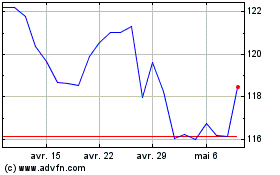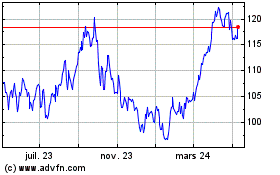Dow Climbs, Powered by Oil Stocks
27 Juin 2018 - 2:06AM
Dow Jones News
By Gunjan Banerji
Gains in shares of energy companies pushed U.S. stocks higher
Tuesday.
Energy stocks rose with oil prices after a senior State
Department official said the administration expects all countries
to stop imports from Iran by November or risk sanctions.
The Dow Jones Industrial Average gained 30.31 points, or 0.1% to
24283.11. The S&P 500 added 5.99 points, or 0.2%, to 2723.06
while the Nasdaq Composite rose 29.62 points, or 0.4%, to
7561.63.
Energy shares posted the biggest gains among the S&P 500's
11 sectors, rising 1.4%. Chevron added $1.55, or 1.3%, to $124.16,
while Exxon Mobil climbed 90 cents, or 1.1%, to 80.64 in the Dow
industrials.
U.S. crude for August delivery climbed 3.6% to $70.53 a barrel,
its highest close in more than a month.
Company-specific news also spurred stock moves Tuesday. General
Electric climbed 99 cents, or 7.8%, to 13.74 in the wake of an
announcement that it is to jettison its ownership in oil-services
firm Baker Hughes and spin off its health-care unit in a strategy
shift that will see it focus on power and aviation. It was the
stock's biggest percentage increase since April 2015.
Shares of American Express lost 33 cents, or 0.3%, to 98.21 as
the company said it was joining forces with Amazon.com to launch a
credit card for small businesses.
Tuesday's moves marked a reprieve after trade concerns jolted
markets Monday, dragging major U.S. indexes to their worst day in
months.
Those worries eased following White House adviser Peter
Navarro's Monday afternoon comments on CNBC that analysts said
helped assuage fears of an all-out trade war.
Against that backdrop, Harley-Davidson announced plans late
Monday to shift more production overseas to avoid European Union
tariffs on motorcycles, imposed in response to Trump administration
tariffs on European steel and aluminum. The motorcycle company's
shares fell 25 cents, or 0.6%, to 41.32 Tuesday as President Donald
Trump warned the company against the move, posting their fourth day
of declines.
"Things coming out of Washington are causing the market to swing
daily, if not hourly," said Randy Frederick, vice president of
trading and derivatives at the Schwab Center for Financial
Research.
Chinese President Xi Jinping recently remarked that his country
would "punch back" against trade restrictions, further spooking
investors already fearful of the prospect of a full-blown global
trade war.
The Shanghai Composite Index entered a bear market, closing down
0.5% at a fresh two-year low.
The Chinese yuan declined 0.5% against the dollar, after hitting
its weakest level this year Monday following remarks from the
Chinese central bank that it would reduce the amount of cash it
requires banks to hold in reserve, allowing them to boost
lending.
The WSJ Dollar Index, which measures the U.S. currency against a
basket of 16 others, rose 0.3%.
With the yuan under pressure in recent weeks, analysts have
discussed the prospect of Beijing devaluing its currency in the
event U.S. tariffs begin to squeeze the world's second-largest
economy. Analysts were expecting the yuan to come under further
pressure but weren't forecasting a repeat of 2016, when the
currency fell 7% during the course of the year.
Some said the recent turbulence was here to stay, despite calmer
markets on Tuesday.
"Protectionism and the dollar strength are driving the market
right now, " said Eddie Perkin, chief equity investment officer at
Eaton Vance. "I think you might see a little bit of more
volatility."
-- Bob Davis and David Hodari contributed to this ar ticle.
Write to Gunjan Banerji at Gunjan.Banerji@wsj.com
(END) Dow Jones Newswires
June 26, 2018 19:51 ET (23:51 GMT)
Copyright (c) 2018 Dow Jones & Company, Inc.
Exxon Mobil (NYSE:XOM)
Graphique Historique de l'Action
De Juin 2024 à Juil 2024

Exxon Mobil (NYSE:XOM)
Graphique Historique de l'Action
De Juil 2023 à Juil 2024
